The Best Substitute for Laundry Detergent is Already In Your Home
Author: Anne Cowart | Editor: Omar Alonso
Review & Research: Jen Worst & Chris Miller

You likely have a substitute for laundry detergent in your home already. Good, because nothing quite takes the wind out of your sails like starting a load of laundry, seeing the water level rise, taking the lid off your detergent to dump some in, and finding out that it’s empty.
You might be able to get a few drops, but that’s hardly enough for your full load of laundry. Now your clothes are soaking wet and you don’t even have anything to wear to the store.
This is where you either admit defeat or step up to the challenge and start looking online for a laundry detergent substitute. Good news, you’re in the right place and I’ve got you covered. You got this.
A quick note: You’ve probably heard that you should never use dish soap as a laundry soap alternative because it will fill your room with soapy foam and make one of the cleanest messes you’ll ever see. They're right.
Even with dish soap out of the equation, there are still other alternatives that you almost certainly have kicking around at home. By the way, you can use dish soap, you just have to be careful about it (more on that later.)
Also, some people are looking for an alternative type of soap for their washing machines simply because they want something that feels more natural than the options we find in most stores that are packed with chemicals and who knows what else. You can also put laundry detergent in your carpet cleaner, and most of these substitutes work for that as well.
Laundry Detergent Substitutes
Whatever your reasons are for seeking out a different type of soap for doing the laundry with, here are some suitable options… You can pick any of these up from Amazon, most from stores like Walmart, etc. But it's likely you already have them in your home.
Baking Soda

Overall, baking soda is probably the best laundry detergent alternative. Most people have some of it in their homes, and that alone is a good enough reason to put it at the top of the list if we’re looking for the most useful and practical options.
On top of that, it’s a natural product and it’s about as pure as you can get when it comes to cleaning supplies. You can use baking soda in your laundry alone or with detergent.
Baking soda does a great job of getting rid of odors. People put it in their fridge to eliminate odors, they’ll sprinkle some in their gym shoes, and so on. So, it stands to reason that it also does a great job of getting smells out of your clothing, much better than water alone could do.
Baking soda is also excellent at getting rid of stains. It’s a strong cleaner, it’s natural, and it’s safe enough to eat. It’s cheap enough to use it all the time if you want to, and it’s so versatile.
You can replace a lot of different cleaning supplies in your home with baking soda, and some people even use it as toothpaste (but it’s been said that it can be kind of harsh on your enamel, so keep that in mind…)
If you buy your baking soda in bulk, it won’t even make a dent in your budget. They practically give the stuff away.
Sodium Borate
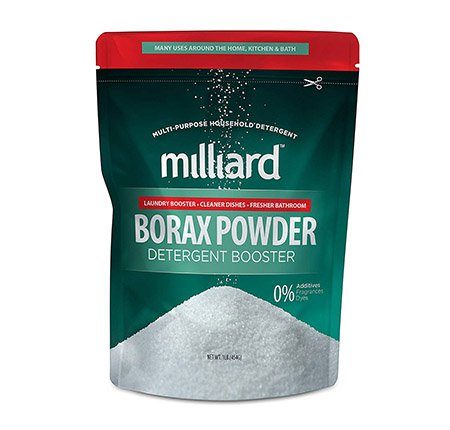
A lot of the things said about baking soda also apply to sodium borate. It will make your water alkaline and do a great job getting rid of odor and stains, but Borax is not safe to ingest. Don’t eat it, don’t brush your teeth with it, don’t put it in your food.
It’s not quite as affordable as baking soda either, and it’s not quite as versatile, but it is a great cleaner that can also replace a number of different products in your home - just keep it away from anyone that might accidentally ingest it.
Borax is the most well-known brand of sodium borate, so keep an eye out for borax if you need a makeshift detergent in a pinch.
Vinegar

Here’s another very common household item that makes a great cleaning agent in a pinch. Sometimes, people like to wash their clothes in vinegar even when they do have laundry detergent, because it does such a great job of getting rid of body odor.
Washing your gym clothes in a separate load using about half a cup (up to one full cup) of vinegar not only helps to get rid of odors and stains, it also naturally softens your clothing, too. You should be separating your laundry by color, too.
If you find that your clothing is left smelling like vinegar after your clothes have finished drying, something is not working correctly. If your laundry room smells like a sewer, you've got much bigger problems on hand.
Some people add upwards of 2 cups of vinegar during the beginning of the rinse cycle for very smelly clothing and report no vinegar odors afterwards, so if you’re getting a lingering vinegar smell, it could mean your rinse cycle isn’t doing an adequate job.
Both vinegar and baking soda can also be used to remove rust from tools, too! Whatever type of spoon you use for measurement, I'd just leave it aside with your detergent materials and make it exclusive for that purpose.
Soap Nuts
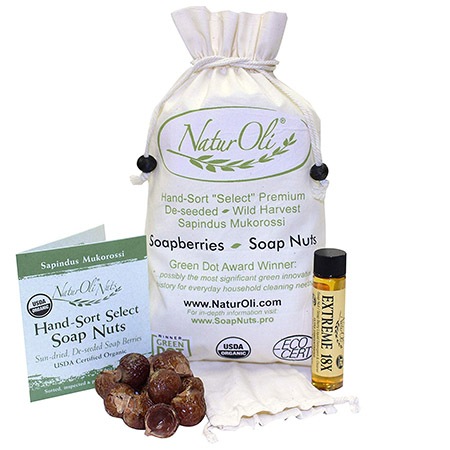
These are popular among people who are looking to rid their homes of the chemicals found in traditional detergents. Soap nuts are placed into a small cotton bag that gets tossed directly into the wash with the clothing.
They’re safe to use and are much more popular in other parts of the world. In the West, you should be able to find them at Asian grocery stores or markets. They aren’t really a mainstream alternative yet, but they’re definitely worth looking into, especially if you like to be ahead of the curve.
Soap nuts lather up nicely when they’re in warm water, and they do a good job of cleaning. They’re completely natural and safe, and they only add a little bit of extra work to the process compared to dumping in some detergent.
You can use them for more than one wash cycle, too. When you’re done with them, you can simply discard them in the garbage or even in your compost pile if you have one.
Rinse Your Old Detergent Bottle
If you’ve come to the end of your laundry detergent bottle and nothing is pouring out anymore, there may still be hope.
Add a few cups of warm water to the bottle, swish it around a bit, and there could very well be enough remnants left inside to get you through the next load or two.
It doesn’t matter if it’s diluted with water because that would happen the moment you dump it into the washing machine, anyways.
For Hand-Washing Your Clothes
So far, we’ve focused on alternatives to detergent that will work great in your laundry machine, but we have yet to touch on the topic of hand washing. Everything we’ve mentioned before will more or less work just fine if you’re washing clothes in a sink or a tub, too.
But here are some options that work particularly well when you’re washing your clothing by hand.
If you’re looking for laundry detergent alternatives for the sake of the environment then cutting down on the electricity used to power a washer and dryer (not to mention not buying one in the first place) can have a huge positive impact and save you thousands of dollars over time.
A Bar of Soap
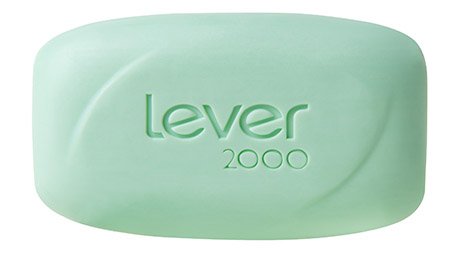
You don’t want to toss one of these types of soap into your washing machine because it would cause more of a mess than it would fix, and it could potentially damage your washer.
But if you’re washing in the sink? Then a bar of soap actually works really well. Get your clothing wet in a sink or tub filled with warm water, and just start scrubbing it a bit with the bar. Using a washboard and one of the clothes wringer alternatives can speed up the process.
It’ll start to create suds, so you don’t need to actually rub the bar across every inch of your clothing. Just let it suds up a bit, and then use that to wash it the same way you would normally wash clothing in a sink.
Shampoo
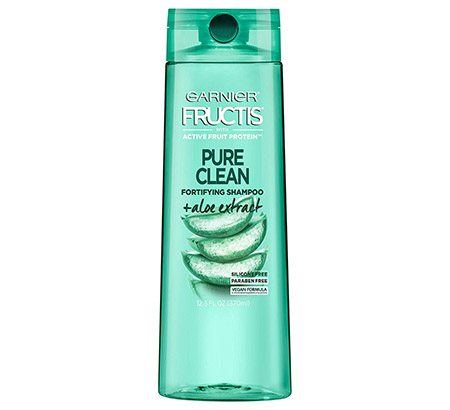
Hand washing your clothes with shampoo also works great. The thing to remember with a lot of these cleaning agents is that, ultimately, they’re all pretty similar. Stuff that’s meant to be used in our hair or on our skin is usually milder than regular laundry detergent.
If you keep an eye out for sales on shampoo (since the natural stuff can be a bit pricey) then you can stock up and have it ready for doing laundry and cleaning your hair.
You really don’t need different types of soaps and cleaners for every distinct area of your home, that’s just a myth that marketers use to sell more bottles of cleaning agents.
We’ve all got a few bottles that never really get used, but if we had extra baking soda or shampoo instead, they wouldn’t just be sitting at the back of the cupboard, right?
Dish Soap
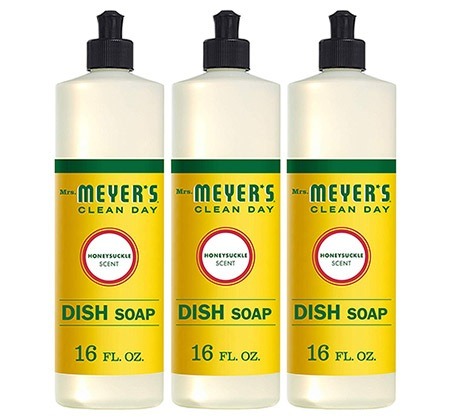
For hand-washing your clothes, dish soap makes a perfectly acceptable laundry soap substitute and it’s quite a bit less expensive than using detergent. I mentioned dish soap in the introduction as something to avoid, but let’s face it - sometimes desperate times call for desperate measures.
As long as you aren’t using an excessive amount of dish soap in your washing machine, it’ll work just fine. In fact, you can use it in your washing machine, too. You just have to be extra careful about it.
If you’ve ever seen a picture of a laundry room filling up with bubbles because somebody used dish soap, that’s true - that can happen - but only if you use entirely too much dish soap. Use 1-3 teaspoons and not a drop more.
The reason that people run into trouble when using dish soap as an alternative to their laundry detergent is because they use way too much of it. They’ll fill up the same size cup as they’d use for detergent and that’s where things go wrong.
Check the label to see if your dish soap contains bleach because that will damage your clothing. If you need to bleach your clothes, use bleach that’s meant for the washing machine and follow the instructions to a T.
Choosing a Substitute for Laundry Detergent
You’ll never have to worry about running out of detergent again because you’ll always have one of the aforementioned alternatives in your home. We’ve covered the bases of all the most common (and some less-common) options to help you find a substitute for laundry detergent.
Whether you were looking for something to use in a pinch that you already have at home, or something a little less common to add to your list to use moving forward, you’ll enjoy knowing your clothes are just as clean (if not cleaner) and that you’re using stuff that’s natural, safe, and cost-effective.




